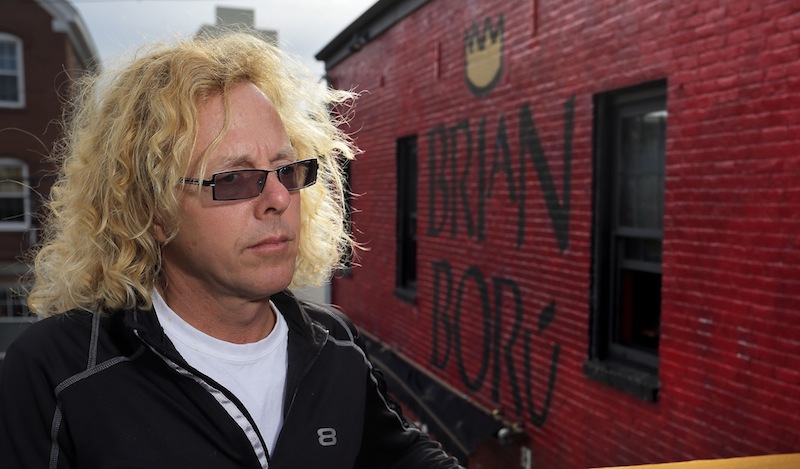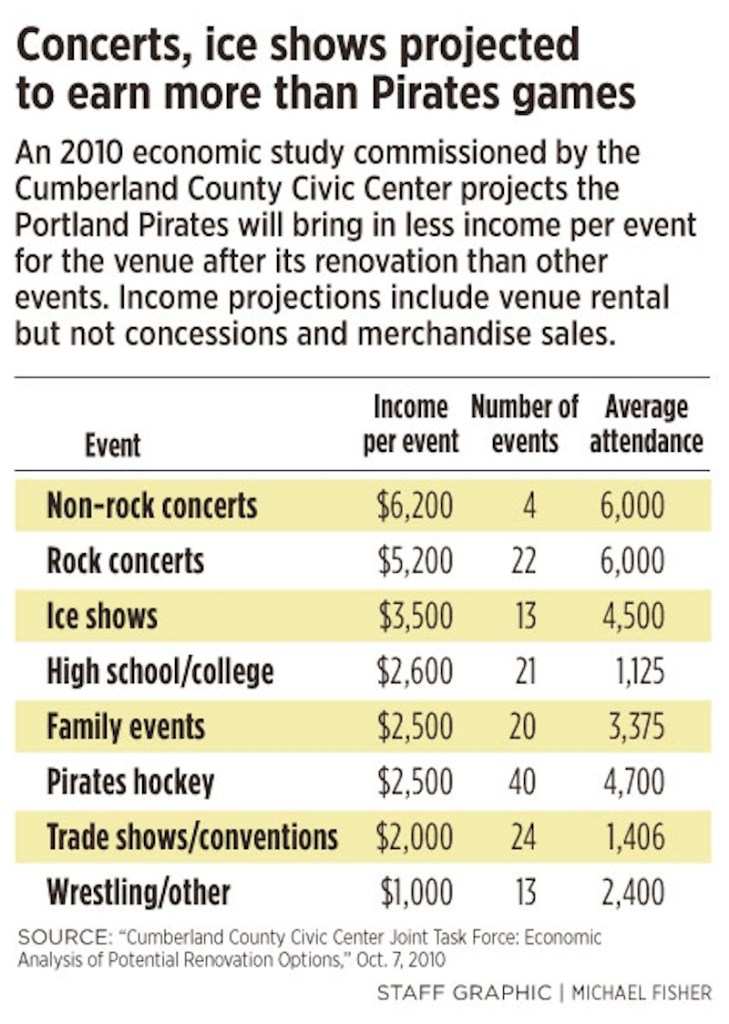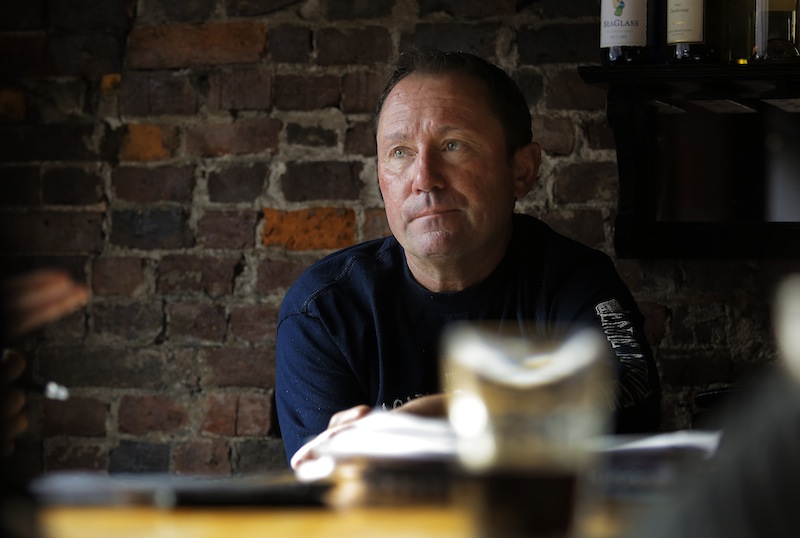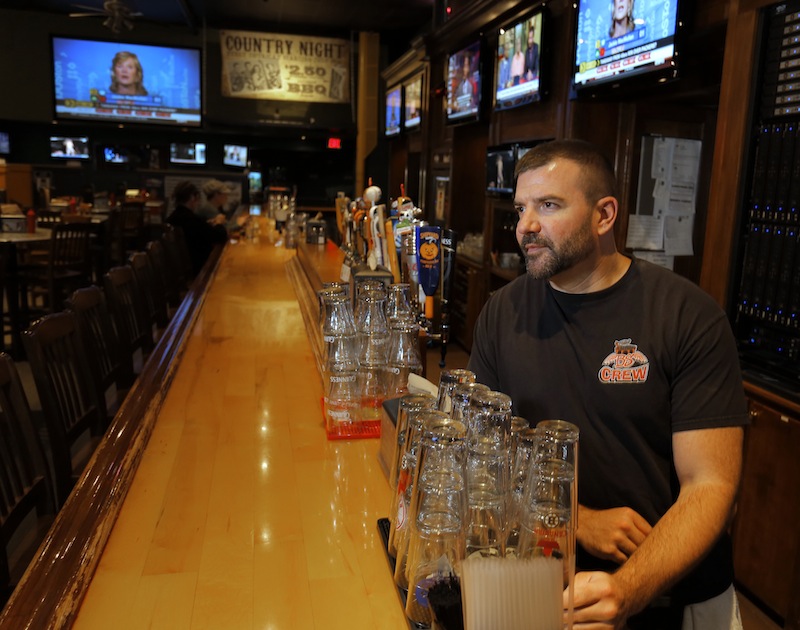PORTLAND – It would take only 15 to 20 music concerts a year for the Cumberland County Civic Center to make up any revenue shortfall associated with losing the Portland Pirates, according to a recent financial analysis.
But owners and employees of nearby businesses say the loss would hurt them financially, disrespect loyal hockey fans and be a slap in the face to Cumberland County voters who supported the arena’s ongoing $34 million renovation.
“I’m surprised the Pirates were not locked in before they started the whole renovation process,” said Dan Steele, a business owner who was an ardent supporter of the renovation. “Those people, in my view, have let us down.”
Lease negotiations between the American Hockey League team and the civic center’s trustees have led to a dispute over revenue from concessions and advertising, and raised the prospect that the team will leave after two decades in Portland.
On Friday, the Pirates sued the civic center in Cumberland County Superior Court, alleging breach of contract and seeking an injunction to prevent any booking of other events on scheduled game nights in 2013 and 2014.
Because the building is being renovated, the Pirates plan to play home games at the Androscoggin Bank Colisee in Lewiston until January. Opening night is scheduled for Oct. 12.
Based on the county-owned arena’s average yearly schedule of about 140 events and estimated economic impact of $20 million, losing the Pirates’ 40 home games per season would cost the local economy about $5.7 million if the civic center couldn’t replace them with comparable events.
According to a study done in 2010, when the renovation was being proposed, concerts generate the most revenue per event for the civic center, including facility rental and concessions.
The study estimated proceeds from concessions at $37,800 for each concert, minus costs of $22,680, leaving a profit of $15,120.
While the study did not specify the average concessions revenue for a Pirates game, it said Pirates fans don’t spend as much as people at concerts.
However, the Pirates’ home games have been a reliable source of revenue.
The civic center expects to book 26 concerts in the first year after the renovation is complete, according to the economic impact study.
Steele, who co-owns the Brian Boru bar and restaurant at 57 Center St. and owns parking lots near the civic center, said more than local businesses will be hurt if the Pirates leave Portland permanently.
“This is a countywide impact,” he said. “It will impact the little guy economically and from an entertainment standpoint. I’m upset about that.”
Alec Altman, who owns Binga’s Stadium Smokehouse and Sports Bar, across Free Street from the civic center, said the overall effect on his business would depend on the civic center’s ability to replace the hockey games with other nighttime events.
“The Pirates thing was good, because it filled the parking lots, it filled the restaurants,” he said.
Altman said that on slower nights such as Tuesdays, Pirates games have boosted his establishment’s sales by $2,000 to $2,500, with some of that increase offset by the cost of additional staffing.
While the civic center tends to schedule only about two dozen rock and country music concerts each year, those events bring as much or more business to Binga’s, he said.
Additional concerts could make up for any shortfall from losing the hockey team, he said.
Daytime events such as home, garden and boat shows may be good for parking lot owners, Altman said, but not the bars and restaurants.
“I’m hoping the Pirates being here or not being here is not going to make or break us,” he said.
The Pirates’ lawsuit has exacerbated an already tense relationship between the civic center and the team over key components of the proposed five-year lease.
In its lawsuit, the team seeks to prevent the civic center’s trustees from breaking an unsigned, one-page resolution reached in April that called for the team to share in concessions and advertising revenue for the first time.
The trustees have said the resolution was only a framework for final negotiations, and that any formal agreement needs approval from the board.
The Pirates say in the lawsuit that the unsigned agreement is enforceable.
In April, the two sides tentatively agreed that the team would get 57.5 percent of net food and beverage sales, something that Pirates managing owner Brian Petrovek had sought for years.
The 57.5 percent would have worked out to about $8,000 a game, under a formula that assumed 3,250 fans spending $9 each and subtracted the costs of concessions, food preparation and state sales tax, Petrovek has said.
Under the previous lease, the Pirates received no revenue from concessions.
Civic center officials dispute the Pirates’ claims about the value of the initial revenue-sharing agreement, but did not provide another figure.
The Portland Press Herald has filed a Freedom of Access request for concessions revenue figures from previous years.
An issue that arose from the agreement in April was the team’s share of revenue from sales of alcohol.
State officials said that under state law the Pirates couldn’t share the revenue from alcoholic beverages because the team is not the liquor licensee.
After further negotiations, the trustees gave the Pirates an alternative arrangement last month in a 33-page lease offer that included 65 percent of food and non-alcoholic beverage sales.
Petrovek rejected that offer, saying it would not offset the team’s loss of alcohol sales, which he said could exceed the total revenue from food sales.
Under other terms of the proposed contract, the Pirates were to get revenue from selling some of the on-ice space for advertising and splitting sales of advertising in most of the rest of the arena.
The Pirates would pay the civic center $1,000 a game, instead of the $2,500 they paid previously. Under the previous lease, the Pirates received a $2,000-per-game rebate because of projected operating losses.
The Pirates have asked the court for an expedited hearing on their lawsuit.
If a deal cannot be worked out, Binga’s bartender Jeff Ellis said he is certain that the absence of hockey games across the street at the civic center will hurt him and his co-workers.
“It’s going to be a tremendous impact,” Ellis said. “Those are big nights for us.”
J. Craig Anderson can be contacted at 791-6390 or at:
canderson@pressherald.com
Twitter: @jcraiganderson
Copy the Story Link
Send questions/comments to the editors.







Success. Please wait for the page to reload. If the page does not reload within 5 seconds, please refresh the page.
Enter your email and password to access comments.
Hi, to comment on stories you must . This profile is in addition to your subscription and website login.
Already have a commenting profile? .
Invalid username/password.
Please check your email to confirm and complete your registration.
Only subscribers are eligible to post comments. Please subscribe or login first for digital access. Here’s why.
Use the form below to reset your password. When you've submitted your account email, we will send an email with a reset code.